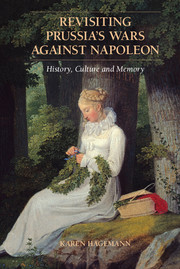Book contents
- Frontmatter
- Epigraph
- Contents
- List of Figures and Maps
- List of Abbreviations
- Acknowledgments
- Revisiting Prussia’s Wars against Napoleon
- Part One A History of Defeat, Crisis and Victory
- Part Two Discourses on the Nation, War and Gender
- Part Three Collective Practices of De/Mobilization and Commemoration
- 8 Military Service
- 9 War Charity
- 10 De/Mobilizing Society
- 11 Honoring and Commemorating War Heroes
- Conclusion
- Part Four Literary Market, History and War Memories
- Part Five Novels, Memory and Politics
- Epilogue Historicizing War and Memory, 2013–1813–1913
- Bibliography
- Name Index
- Subject Index
- Plate section
Conclusion
Published online by Cambridge University Press: 05 March 2015
- Frontmatter
- Epigraph
- Contents
- List of Figures and Maps
- List of Abbreviations
- Acknowledgments
- Revisiting Prussia’s Wars against Napoleon
- Part One A History of Defeat, Crisis and Victory
- Part Two Discourses on the Nation, War and Gender
- Part Three Collective Practices of De/Mobilization and Commemoration
- 8 Military Service
- 9 War Charity
- 10 De/Mobilizing Society
- 11 Honoring and Commemorating War Heroes
- Conclusion
- Part Four Literary Market, History and War Memories
- Part Five Novels, Memory and Politics
- Epilogue Historicizing War and Memory, 2013–1813–1913
- Bibliography
- Name Index
- Subject Index
- Plate section
Summary
The collective practices and the political culture of the period of the wars of 1813–15 and the postwar era with their movements, associations, festivals, rituals and symbols, developed in Prussia and other parts of Germany, were not only instrumental in their time, but also had a lasting influence on monarchical, nationalist and military culture until the First World War. During the wars of 1813–15 they significantly helped to mobilize patriotic-national sentiments and with them war support, albeit with substantial regional variations, as indicated by the different levels of mobilization for the militia and the volunteers’ movement, for wartime charity and patriotic women’s associations, and for the patriotic-national and military festivals, rituals and symbols introduced. After the wars, associations, celebrations, rituals and symbols organized the commemoration of the fallen soldiers and other war victims and supported the process of cultural demobilization more generally, including the integration of the returning militiamen and volunteers into civilian life. Just as the patriotic-national discourse of the wars of 1813–15 and the postwar era yielded a template for nationalist rhetoric in the following century, so too did the patriotic-national associations, festivals, rituals and symbols of the period provide a blueprint for monarchical, nationalist and military culture up to the First World War, as the history of the Iron Cross demonstrates. Hence, both the patterns of political thinking and the collective practices and cultural representation developed during and after the period of the struggle against Napoleon were important carriers of the collective memories of the Anti-Napoleonic Wars. These memories reflected to a surprising extent the old political and regional battles of the war and postwar period, at least until German unification in 1871. Popular literary media were another important carrier of collective memories. The most influential among them were the history books, autobiographical accounts and novels that are studied in the next two parts.
- Type
- Chapter
- Information
- Revisiting Prussia's Wars against NapoleonHistory, Culture, and Memory, pp. 247 - 248Publisher: Cambridge University PressPrint publication year: 2015



